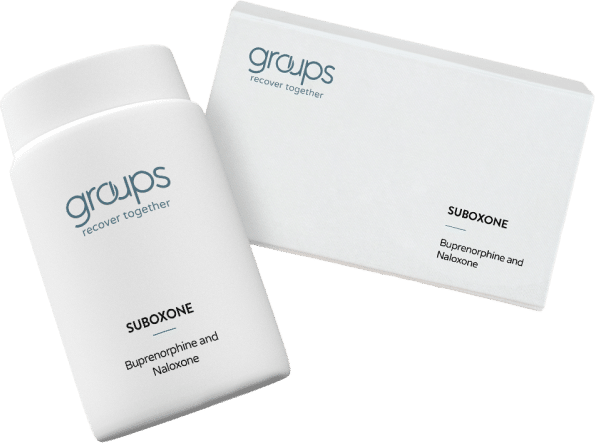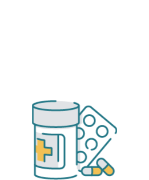
Quick Access to Suboxone and Treatment—Online or In-Person
At Groups, we combine Suboxone treatment with weekly group therapy and personalized support to help you build the life you want to live. Stop feeling sick. Start your recovery today.

At Groups, we combine Suboxone treatment with weekly group therapy and personalized support to help you build the life you want to live. Stop feeling sick. Start your recovery today.
We help our members get better

We help our members get better
Start your recovery today
Fill out this form to learn more about our program—no pressure or obligations.
By submitting your information, you agree to our Privacy Policy and Terms of Use.
Suboxone is a combination of two drugs – buprenorphine and naloxone that work to ease withdrawal symptoms and cravings—reducing the dependence on opioids and supporting long-term recovery.
Treatment with Suboxone lowers the risk of overdose death by more than 50%. Compared to Methadone, Suboxone has fewer side effects and safety concerns. You can get it from a pharmacy rather than daily clinic visits.

| Suboxone | Methadone | |
|---|---|---|
| Helps ease withdrawal symptoms | ||
| Helps decrease cravings | ||
| Reduces the risk of opioid overdose | ||
| Fewer side effects | ||
| Fewer safety concerns | ||
| Can get it outside of a clinic |


Medication to ease cravings and withdrawal

Just 1 hour of Group therapy per week, in-person or virtual

General healthcare services, housing, and job resource to help you get back on your feet
“Being able to see other people doing the right thing and their lives changing gave me the hope to see that my life would change too.”
Adam,
Groups Member
“At Groups, you’re not just a number. You’re actually a part of a team.”
Ben,
Groups Member
“I feel stable, I feel happy and I don’t feel that relapse is part of my equation anymore.”
Candy,
Groups Member
“Coming to Groups gave me, ME back. It gave me a reason to want to wake up in the morning.”
Megan,
Groups Member
Major Insurance Plans Accepted











We accept Medicaid, Medicare, and many commercial insurance plans, including Aetna, Optum, United Healthcare, Humana, Anthem, Blue Cross Blue Shield, Harvard Pilgrim Healthcare, and more. Visit our insurance page for more information. For coverage information that’s specific to your area, call us at (888) 858-1723.
No! People taking Suboxone as prescribed don’t feel “high” or euphoric, don’t feel sick, and can function normally in their daily life. This means they can drive, work, play, eat, be with their family, etc., all while feeling normal. Eventually, many people can taper down their dose of Suboxone and some can even discontinue it altogether. But that is a personal decision made between that individual and their doctor.
Suboxone is a partial opioid agonist. That means it binds to the body’s natural opioid receptors and partially activates them. Opioid receptors are the proteins on cells in the brain and nervous system that are involved in things like pain control, emotional regulation, and other functions. Unlike methadone, oxy, fentanyl, and other common opioids which are full agonists, Suboxone doesn’t completely activate the opioid receptors. As a result, Suboxone can help reduce withdrawal symptoms and cravings without making the person taking it feel euphoric or “high.”
When someone first begins taking Suboxone, they may experience:
These side effects typically go away after taking medication for a few days. Groups members can talk to their providers about ways they can manage uncomfortable side effects.
Suboxone is longer-lasting and less powerful than other opioids, so instead of making someone “high,” it helps restore the brain’s normal chemistry and function. People who take Suboxone will become used to the medication and may have withdrawal symptoms if they stop taking it suddenly without tapering down. However, this doesn’t mean someone is addicted to Suboxone.
Not necessarily. Suboxone is safe for long-term use, and for many people, this is the appropriate and safest course of action. However, for others, it’s better to taper down dosages and eventually discontinue the medication entirely. It’s different for everyone and the Groups care team is here to help you no matter what your journey looks like.
The call is free. You have nothing to lose!
Recover Together, Inc. © 2023 | All Rights Reserved | Privacy Policy | Notice of Privacy Practices | Terms of Use
Suboxone® is a registered trademark of Indivior PLC. Any reference to it is for informational purposes only, and is not endorsed or sponsored by Indivior PLC.

Important safety information:
Suboxone (buprenorphine/naloxone) is indicated for the treatment of opioid dependence in adults. Suboxone should not be taken by individuals who have been shown to be hypersensitive to buprenorphine or naloxone as serious adverse reactions, including anaphylactic shock, have been reported. Taking Suboxone (buprenorphine/naloxone) with other opioid medicines, benzodiazepines, alcohol, or other central nervous system depressants can cause breathing problems that can lead to coma and death.
Other side effects may include headaches, nausea, vomiting, constipation, insomnia, pain, increased sweating, sleepiness, dizziness, coordination problems, physical dependence or abuse, and liver problems. For more information about Suboxone (buprenorphine/naloxone) see Suboxone.com, the full Prescribing Information, and Medication Guide, or talk to your healthcare provider.
You are encouraged to report negative side effects of drugs to the FDA. Visit www.fda.gov/medwatch or call 1-800-FDA-1088.
Disclaimer: The results of this quiz are not intended to diagnose or treat illness.
This is not a replacement for a physician visit or intake appointment with a medical professional.